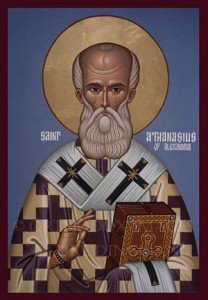I would first offer a few more thoughts from our Father Athanasius of Alexandria. In the last bulletin I ended this article by sharing with my readers that the divine identity of Jesus, equal to the Father, was not a matter of abstract or purely theological truth. It indicated the condition of mortal humanity – which could neither save itself nor be saved by another creature – and the true nature of God, who himself performed the salvation of the world rather than act indirectly through created intermediaries or through an all-powerful but mechanic fiat or simple decree. For Athanasius, salvation is a restoration of direct fellowship and communion between God and man, because anything less than such a fellowship would imply a limitation of divine love. Hence his famous definition of salvation as deification (theosis), which became a standard of Greek patristic thought.
The affirmation of Christ’s divinity in Nicaean and Athanasian categories inevitably raised the question concerning the historical Jesus as man. The issue involved long debates, schisms and the search for appropriate definitions at Councils – Nicaea (325), Ephesus (431), Chalcedon (451), Constantinople II (553), Constantinople III (680) and Nicaea II (787). The result was a commitment to a single Christological dogma in the East and in the West, although differences remained in the spiritual vision of the reality of the life in Christ. At the center of these debates stood the figure and the teaching of Cyril of Alexandria (d. 444).
For Cyril, Christ was the Emmanuel. Before Cyril had engaged himself in bitter theological debates with Nestorius (428-431), the basic inspiration of his understanding of the Christian mystery appeared in his serene and noncontroversial exegetical writings, particularly his Interpretation of the Gospel of John and his commentaries on other New Testament Writings. Here Cyril’s main concern was not to provide his readers with a rational scheme of the incarnation but to express its kerygmatic meaning: God, who “alone has immortality” is the only Savior from corruption and death. This was also the central inspiration of Athanasius in his early and famous treatise On the Incarnation of the Word, wherein he truly maintained, as he did in his polemics against Arius: that only God can save.
Both Athanasius and Cyril profoundly impacted and shaped the Church’s ideas of Who Jesus Christ IS

